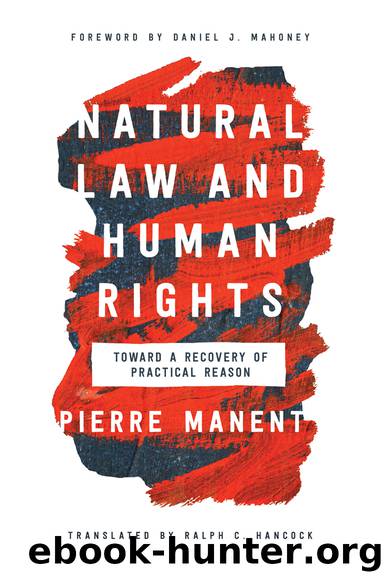Natural Law and Human Rights by Pierre Manent

Author:Pierre Manent
Language: eng
Format: epub
Publisher: University of Notre Dame Press
Published: 2020-01-16T00:00:00+00:00
The “Autonomous” Subject
Before further analyzing this dismemberment of which the modern state is at once the producer and the product, and in order to bring out its crucial significance, I would like to suggest that it has summoned the apparition of a specter that will continue to haunt not only our collective order but our intimate awareness of ourselves, the specter of the subject that commands itself, the specter of the autonomous subject. Recall that this is a notion that has no meaning in the classical understanding of human action and that for this reason was explicitly dismissed as a chimera conceived by the demon of analogy—in the event, by the analogy between the individual agent and the political body.2 It was only owing to a growing incomprehension of the role and of the meaning of the pair of terms “command-obey” in practical life that this notion has had any plausibility; and the graver this obfuscation became, the more the specter grew in scope and authority, until it came to cover the poor agents that we have become with its boundless, albeit vain, pretentions.
To reduce the argument to what is essential, I would say something along the following lines. However bound together they may be, to command and to obey are two qualitatively different actions that therefore require different agents who stand differently in relation to the action. Each is complete as an action, and, I might say, each completely occupies the agent whether he is commanding or obeying. The agent who commands has no place in himself for one who obeys; the agent who obeys has no place in himself for one who commands. Let us have a closer look. He who commands begins the action. Once engaged, this action has the qualities included in its character as beginning-commanding. As a command it is a complete action and is assessed as such: has the agent commanded well? As for the action of the one who obeys, its character is that of an action that does not begin but only extends or pursues more or less faithfully: this is a case of a lesser action, an action, one might say, of lesser substance as an action; it is thus a different action, but as an act of obedience it is also a complete action. And it is assessed as such: has the agent obeyed well? Since it is a different action, there is no question of an agent being able to be in the position of commanding and of obeying with respect to the same action, of possessing at the same time and with respect to the same action the commanding and the obeying disposition. Once again, to command and to obey are two essentially different and equally complete actions. From the moment I try seriously to imagine that I am commanding myself or that I am obeying myself, I must imagine that the one who commands and the one who obeys are really two, and thus that I am obeying or commanding not myself, but someone other than myself, that is, another.
Download
This site does not store any files on its server. We only index and link to content provided by other sites. Please contact the content providers to delete copyright contents if any and email us, we'll remove relevant links or contents immediately.
| Comparative | Conflict of Laws |
| Customary | Gender & the Law |
| Judicial System | Jurisprudence |
| Natural Law | Non-US Legal Systems |
| Science & Technology |
Future Crimes by Marc Goodman(2997)
American Kingpin by Nick Bilton(2966)
The Meaning of the Library by unknow(2064)
Inside the Middle East by Avi Melamed(1937)
On Tyranny by Timothy Snyder(1857)
Why Nations Fail: The Origins of Power, Prosperity, and Poverty by Daron Acemoglu & James Robinson(1784)
Living Silence in Burma by Christina Fink(1726)
Putin's Labyrinth(1655)
The Mastermind by Evan Ratliff(1589)
Think Like a Rocket Scientist by Ozan Varol(1393)
Law: A Very Short Introduction by Raymond Wacks(1380)
The Smartest Kids in the World by Amanda Ripley(1365)
Leadership by Doris Kearns Goodwin(1346)
The Rule of Law by Bingham Tom(1316)
A Dirty War by Anna Politkovskaya(1311)
It's Our Turn to Eat by Michela Wrong(1299)
Philosophy of law a very short introduction by Raymond Wacks(1295)
Social Media Law in a Nutshell by Ryan Garcia & Thaddeus A Hoffmeister(1248)
Civil Procedure (Aspen Casebooks) by Stephen C. Yeazell(1170)
